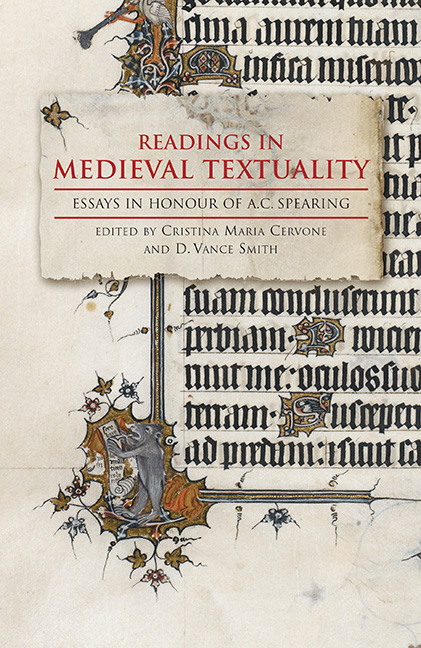Book contents
- Frontmatter
- Contents
- List of Illustrations
- List of Contributors
- A. C. Spearing's Work and Influence
- Bibliography of A. C. Spearing's Works
- I Reading Experience and Experientiality
- II Revisions and Re-visioning of Alliterative Poetry
- III Subjectivity and the Self
- IV Reading for Form
- 8 The Inescapability of Form
- 9 Destroyer of Forms: Chaucer's Philomela
- 10 Gower's Confessio Amantis and Chaucer's Canterbury Tales as Dits
- 11 Poems without Form? Maiden in the mor lay Revisited
- 12 “I” and “We” in Chaucer's Complaint unto Cervone Pity
- V Epilogue
- Works Cited
- Index
- Tabula Gratulatoria
9 - Destroyer of Forms: Chaucer's Philomela
from IV - Reading for Form
Published online by Cambridge University Press: 25 October 2017
- Frontmatter
- Contents
- List of Illustrations
- List of Contributors
- A. C. Spearing's Work and Influence
- Bibliography of A. C. Spearing's Works
- I Reading Experience and Experientiality
- II Revisions and Re-visioning of Alliterative Poetry
- III Subjectivity and the Self
- IV Reading for Form
- 8 The Inescapability of Form
- 9 Destroyer of Forms: Chaucer's Philomela
- 10 Gower's Confessio Amantis and Chaucer's Canterbury Tales as Dits
- 11 Poems without Form? Maiden in the mor lay Revisited
- 12 “I” and “We” in Chaucer's Complaint unto Cervone Pity
- V Epilogue
- Works Cited
- Index
- Tabula Gratulatoria
Summary
Literary form may … elicit those existential feelings lying at the heart of any object: a sense of strangeness or familiarity, disgust or indulgence, utility or murder.
(Roland Barthes, Writing Degree Zero)Especially in the first part of his career, when he announced the “detailed analysis of literary texture” in his first book – A. C. Spearing's work has been associated with formalism. From the start, however, the definition of “texture” stretched well beyond the rigorous categories of rhetorical tropes catalogued by Empson and other close readers, practical critics, and New Critics. Rather, Spearing's work is more interested in the armature underneath that gives texture to the narrative, an armature that is no longer self-evident, and must be illuminated in its own right. Good early evidence of this approach is the opening chapter on sermon manuals in his book on the Gawain-poet, in which he shows how the Gawain-poet borrows from the rhetorical and structural features of the model medieval sermon. Indeed, what Spearing actually has to say about “texture” (now) seems unexpectedly reticent, even reluctant to acknowledge its importance for medieval literary criticism. In his first book, he substantially qualifies the ways in which “close reading” can be practiced on medieval texts, arguing for attention to the longer span of passages rather than the closeness that assumes that “the effect of the whole [could be] present locally.”
This first practitioner of close reading in medieval poetry, as he is sometimes described, begins, in other words, with a nuanced and complex idea of what “form” is in medieval texts, and a protocol that already depends upon the situatedness, the cultural, if not political, context of texts. Spearing's kind of reading differed (and still differs) from the standard practices and assumptions of new critical/formalist reading. The tendency was, most visibly in critics like William Empson and Cleanth Brooks, to categorize and classify literary effects (braced, in the case of F. R. Leavis, with a hearty classification of the worthiness of texts themselves).
- Type
- Chapter
- Information
- Readings in Medieval TextualityEssays in Honour of A.C. Spearing, pp. 135 - 156Publisher: Boydell & BrewerPrint publication year: 2016



